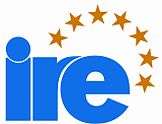Institute of the Regions of Europe
|
The logo of IRE | |
| Abbreviation | IRE |
|---|---|
| Formation | 2004-12-21 |
| Headquarters | Salzburg, Austria |
| Location |
|
President | Franz Schausberger |
Staff | 4 |
| Website |
www |
The Institute of the Regions of Europe (IRE) (German: Institut der Regionen Europas; IRE) is a research institute founded in 2004 by Franz Schausberger, former President of the Land Salzburg.
Purpose
The main aim of the foundation was to create a supra-regional and politically independent platform for municipalities, regions and enterprises in an enlarged Europe in order to take greater account of the importance of the regions and municipalities – also on the basis of the Lisbon treaty, reduce existing information deficits, address a variety of existing problems and seek to utilise the economic potential of regional and supra-regional cooperation between the regions of Europe.[1] With its activities and initiatives, the IRE supports decentralisation and regionalisation and provides expertise for strengthening respective processes. There is a special focus on the new EU member states as well as the candidates for accession and potential candidates.
With its non-partial and non-profit character the IRE wishes to cut informational deficits and to foster the economic potentials in the European regions. As a supporter of the European integration process the institute is obliged to the European principles of tolerance, international understanding and subsidiarity. The institute is financed by founders, membership fees and sponsoring. It has its seat in Salzburg/Austria and disposes of an administrative infrastructure in Vienna as well.[2]
Members
Up to more than 100 member regions, municipalities, cities and towns as well as enterprises from 18 European countries have joined the IRE network. They are connected by their interest to formulate their requests and to strengthen the importance of regional and local levels in the political decision making process. The number of members is increasing constantly.
Activities
On behalf of the Austrian Presidency of the Council of the European Union the IRE has started a series of Café d’Europe on Europe Day, 9. May 2006, in all EU-capitals. The main aim of these events was to use the relaxed atmosphere of a traditional coffee house, in order to discuss EU topics such as integration process and participation of civil society in decision making. Under the title “Café d’Europe Régional” the institute continued to organize this form of events in various European cities. Top-class referents from the areas of politics, diplomacy and economy as well as an interested audience are invited to discuss and thrash out.
The annual Conference of European Regions and Cities brings together about 300 representatives of politics and business from the various European regions. It focuses on current topics for European regions and cities with regard to future strategies and challenges for politics and businesses.
Moreover, Expert Conferences are continuously organised on specific topics of regional politics.
Research
The IRE monograph series consists of research papers on the topics of regional and local election analysis, political systems, regional location development, EU regional policy and other areas focusing on regionalisation and decentralisation. A selection of papers as well as other publications is published annually in the “Yearbook of Regionalism”.
Published four times per year, the magazine "newsregion" informs more than 2.000 decision makers in Europe about the activities of the IRE.
Board of Patrons
The IRE was born from the wish to strengthen the regions and cities of Europe. Along the operational instruments, such a wish also needs a high-level backing. To fulfil this duty, well-known and important people of the public life in Europe support the IRE with their signing of a public declaration.
- Benita Ferrero-Waldner - EU-Commissioner for External Relations and European Neighbourhood Policy (2004−2010)
- Hubert von Goisern - Song Writer and World Musician
- Johannes Hahn - European Commissioner for Regional Policy
- Ivo Josipović - President of Croatia
- Jean-Claude Juncker - Prime Minister of Luxembourg, President of the Euro Group (2005−2013)
- Helmut Kohl - Federal Chancellor, Germany (1982−1998)
- Wolfgang Schüssel - Federal Chancellor, Austria (2000−2007)
- Karel Schwarzenberg - Minister of Foreign Affairs, Czech Republic (2007-09 & 2010-13)
- Edmund Stoiber - Minister-president of the state of Bavaria (1993-2007)
- Theo Waigel - Federal Minister for Finance, Germany (1989−1998)
- Helmut Zilk✝- Mayor of Vienna (1984−1994)
Internship Programme
To young people the IRE offers a possibility for an internship at the IRE office in Salzburg. Therefore, the IRE is in cooperation with various universities and institutes all over Europe. By now, over 120 students from all kind of academic fields and various European countries worked on a research paper on a topic related to European or regional policy. The results are published within the frame of the IRE monograph series.
References
- ↑ http://www.eu2006.at/en/The_Council_Presidency/cafeeurope/ire.html
- ↑ http://www.caesar.uns.ac.rs/partneri/ire.html
